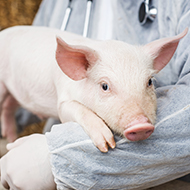Breeding for disease resilience is more cost-effective, study suggests

The study highlights the cost benefits of breeding animals to be resilient against disease.
Breeding animals to be resilient against disease would be more cost-effective than breeding based on production traits, new research suggests.
Findings published in Genetics Selection Evolution show that breeding for optimum disease resilience could be three times more profitable than that of breeding based on production traits in disease-free conditions.
Professor Andrea Doeschl-Wilson from the University of Edinburgh's Roslin Institute, which led the study, said: “Managing infectious disease continues to place a heavy toll on livestock producers and the animals they raise. By applying new statistical methods to big data from genomic and automated recording technologies, we can breed livestock that are more resilient to infection.”
In the study, researchers used data from a previous study of piglets with Porcine Respiratory and Reproductive Syndrome (PRRS) to develop mathematical models to estimate the economic value of disease resilience.
According to their calculations, the value of selective breeding based on resistance and tolerance during infectious conditions was more than three times that of breeding based on production traits in disease-free conditions, demonstrating the high economic value of disease resilience.
The team found that data or technologies that determine an animal’s response to infection based on its genes could be used to mitigate trade-offs between traits that contribute to resilience.
They suggest that monitoring the level of infection in an animal over time, as well as tracking production traits, could be used to estimate the influence of resistance and tolerance on its response to infection.



 The RCVS has announced a new version of its 1CPD mobile app, with enhanced features for veterinary surgeons and veterinary nurses to record their continuing professional development.
The RCVS has announced a new version of its 1CPD mobile app, with enhanced features for veterinary surgeons and veterinary nurses to record their continuing professional development.